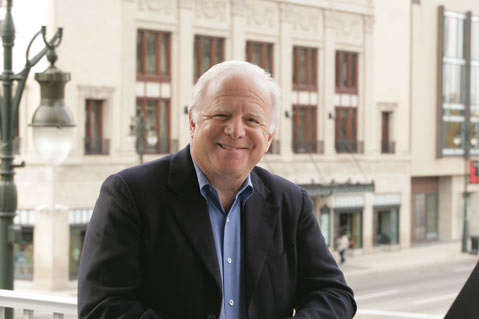Maestro Leonard Slatkin
The Renowned Conductor on Beethoven, Shostakovich, and Sierra

Unquestionably one of the most memorable aspects of the Music Academy of the West’s summer festival is the opportunity to see some of the world’s greatest symphony orchestra conductors in action. Although we have a splendid maestro of our own in Santa Barbara Symphony’s Nir Kabaretti, and we get to see the world’s greatest orchestras courtesy of both CAMA and UCSB Arts & Lectures, there’s nothing quite like seeing a world-class conductor take the podium in front of a group of hyper-talented young people.
With so many prominent conductors involved — seven this season — it’s hard to pick a favorite, but for many that would be Leonard Slatkin, the artistic director of the Detroit Symphony Orchestra, who is here this week and will conduct on Saturday, July 13. Slatkin is passionate, articulate, and opinionated, and he brings a remarkable zeal to the task of teaching that informs and animates every aspect of his musical life. Somehow in the midst of a busy conducting calendar, Slatkin has found time to write a very satisfying book called Conducting Business, which he will be signing at Chaucer’s Books on July 11. I spoke with him by telephone last week about his upcoming concert, which features works by Roberto Sierra, Ludwig van Beethoven, and Dmitri Shostakovich.
The Shostakovich Symphony No. 5 has a very dramatic historical context — Stalin held the composer’s life in his hands. Is that something you hear in the music? Having grown up with the Shostakovich Symphony No. 5, I hear it more in the context of the Russian musical heritage. I know what kind of threat Stalin posed to Shostakovich, but when I listen, I don’t hear a political statement, and I don’t believe that its politics are why it’s still in the repertoire. It’s still played because of how far the music reaches down into the emotions. I try to understand all music as just music and not as a political statement or even as a reflection of some specific historical consciousness.
I know how that sounds coming from a conductor, but let me explain with an example. Take John Corigliano’s Symphony No. 1, because for me, the situation with Shostakovich No. 5 is like that. Corigliano wrote the symphony because of the AIDS crisis, and he wouldn’t have written it without that specific historical context. It was why he wrote his first symphony — to mourn all the lives being lost to AIDS at that moment. Today, AIDS has undergone a big change in treatment, and many more people survive with it thanks to advances in medicine. So now, when people listen to the Corigliano Symphony No. 1, part of that original feeling of urgency is gone, and what has come in to replace it is another valid appreciation of this wonderful composition. There’s still sadness, but it’s not the same as when it was written, and it shouldn’t be. We live in different eras.
How have you found the experience of conducting the Academy Festival Orchestra? This is my third time coming to the Music Academy, and I am very impressed with what I’ve seen. It’s an extraordinary place for music-making among young musicians, and the way it’s set up seems to encourage real focus for the entire session. I’m delighted to be back, and I’m looking forward to the concert.
4•1•1
The Academy Festival Orchestra with conductor Leonard Slatkin will appear at the Granada Theatre (1214 State St.) on Saturday, July 13, at 8 p.m. For tickets and information, call (805) 695-7931 or visit musicacademy.org.



